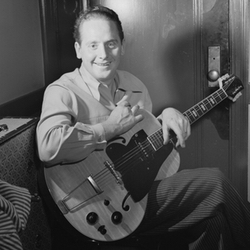Who Invented the Electric Guitar?
 Famed Musician and Inventor
Famed Musician and InventorLes Paul
Who invented the electric guitar? This is a common question asked by many interested in the rich history of one of the most popular musical instruments (if not the most popular) around. Unfortunately, the answer isn't entirely clear cut.
The Early Years
One of the first known attempts to amplify acoustic acoustic sound came
from an engineer and innovator named Lloyd Loar, who worked at Gibson
Guitars in the early 1920s. Loar developed what has now come to be known
as a contact pickup, which attached directly to the guitar's body and
attempted to amplify the vibrations from the soundboard. As best as can
be determined, the first commercially touted electric guitar (by
Stromberg-Voisinet) utilized this type of pickup system.
The "Frying Pan"
Unfortunately,
these contact-type pickups didn't produce the kind of volume that was
needed. The better solution was to mount the pickup directly to the body
which significantly increased the volume output. The first electric
guitar with any significant success has come to be known affectionally
as the "Rickenbacker Frying Pan," an electrified Hawaian guitar jointly
developed by Adolph Rickenbacker and George Beauchamp in the early
1930s. While it looked, well, like an electric frying pan, the
instrument proved the viability of the electric guitar.
The Golden Years
The
popularity of the electric grew during the 1930s, especially with the
popularity of virtuoso guitarist Charlie Christian, who sported a Gibson
ES-150 that had been released in 1936. And although neither man
invented the solid body electric guitar, both Les Paul and Leo Fender
made invaluable contributions to the instrument's success, with Fender
producing the first mass-produced electric guitar in 1950 with the
Fender Esquire (the ancestor of the Telecaster).
While Les Paul's
original solid body guitar concept was rejected by Gibson, eventually
the company released a Les Paul model (with dual soapbar pickups and a
set-in neck) endorsed by the artist that offered a contrast to the
bolt-on single-coil pickup equipped-Fender. Although some players are very adamant about playing either Fender or Gibson guitars (or one of their imitators), the reality is that most players have found both types of guitars appealing at one time or another.
So, the Answer to "Who Invented the Electric Guitar" is . . .
No one single person. Sorry. There's much more to be told in the short but fascinating history of the electric guitar itself, but the best answer to the question is this: a small group of very talented musicians and inventors who had no idea they were going to help redefine the music industry.
Add Your Comments Here!
I'd love for you to be a contributor to SoMuchGuitar.com!
Just fill out the information below to add to this page. I'll be in touch about your submission soon!